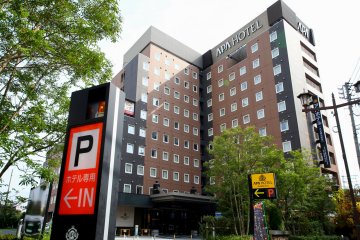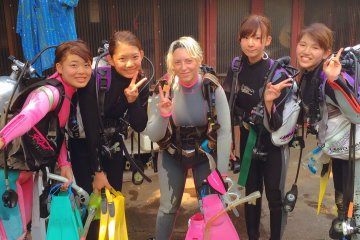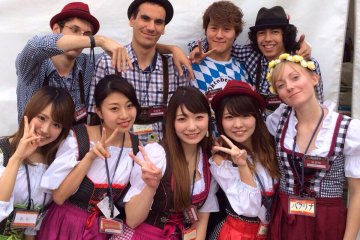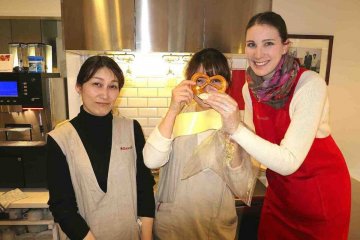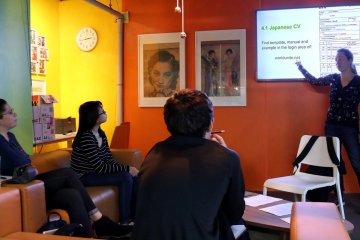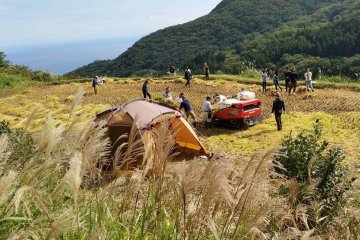Staying for up to a year in Japan, traveling around the country, and at the same time doing a job to finance this dream coming true? The Working Holiday Visa for Japan makes this possible for young people aged 18-30 of a variety of nationalities. Here we outline what you can expect as well as the benefits of choosing a support agency, like World Unite, to help get started.
What is the Working Holiday Visa?
Japan has bilateral agreements with several other countries. These agreements have the purpose of strengthening cultural exchange and ties between the countries by making it possible for young Japanese to spend a maximum of one year of Working Holidays in the partnering country, and respectively young people from that country to do the same in Japan.
The Working Holiday Visa is a cultural exchange visa and not a "work visa"... Nevertheless, it allows you to legally work in Japan to be able to afford your 1-year stay; Australians can even stay for 18 months! There are no restrictions on the maximum number of weekly hours you can work or on the income. Besides, almost all jobs are possible.

What is a typical working holiday stay in Japan like?
It is up to you what exactly you will do during your year of Working Holidays in Japan, but the main reason for your stay should always be "getting to know Japan". While some participants travel a lot in Japan, others prefer to stay at few places for a longer time. Some participants work a lot, while others only a little. Joining Japanese language classes is also possible on the Working Holiday visa.
Typical jobs include sales positions in shops, being a kitchen assistant or waiter in restaurants, cafés and bars, childcare, teaching languages (possible in English, French, Spanish, German, Korean, Chinese...), light factory work, farm work, and jobs at hotels, ski resorts or ryokans (traditional inns).
No need to know any Japanese. Working as a foreign language teacher or doing simple jobs where you don't have to speak a lot is possible, even if you can only communicate in English. Nevertheless, Japanese language skills open the door to significantly more jobs, usually better paid. If you learn Japanese during your stay in Japan, you can change your job once your language skills have improved.
On a Working Holiday visa, you are more likely to get jobs that are remunerated around the statutory minimum wage, which differs from prefecture to prefecture. But even if you only work around 28 hours a week part-time, your income should be enough to cover your living expenses.

Working Holiday Tips
- Except for farmwork, short-term jobs are not common in Japan. You will significantly increase your job opportunities if you plan your trip in such a way that you stay in a place for at least 3 months. If you want to travel around Japan, it is best to do so between different jobs.
- In larger cities, it is often easier to get jobs than in small towns. In bigger cities, you can also find the so-called "Share Houses", which are the accommodation option that is easiest to arrange and cheapest.
Who can join?
You need to be 18-30 years old at the time of applying for the Working Holiday visa and have a passport from Argentina, Australia, Austria, Canada, Chile, Czech Republic, Denmark, Estonia, France, Germany, Hong Kong, Hungary, Iceland, Ireland, Lithuania, Netherlands, New Zealand, Norway, Poland, Portugal, Slovakia, South Korea, Spain, Sweden, Taiwan, or UK (as per 2020). If you have a Japanese passport, you can, of course, do the same activities in Japan as Working Holiday visa holders.
There are a few more requirements you must fulfill that you can find on the website of the Japanese embassy of your home country. For example, you must have a certain minimum amount of money available. New countries are added every year to the Working Holiday visa program.
Organizing your Working Holidays yourself or with an agency?
You can organize your Working Holiday in Japan yourself, but there are a few things to consider:
- English skills are not widespread in Japan. Many tasks like signing and canceling a phone contract, opening a bank account, making bank transactions, or doing the necessary administrative procedures are usually only possible in Japanese.
- Information that can be found online about what, where, how, and when you have to do certain administrative things such as matters related to the Japanese National health insurance, pension funds and taxes, is often incorrect or outdated. You can make mistakes that end up costing you more than using the services of an agency that deals with such matters on a daily basis.
- Cultural differences, also related to working life, are huge compared to western countries. How to apply for a position in writing, how to behave (or not) during a job interview, or the correct forms of communication with your Japanese colleagues and superiors at your workplace is challenging for many Working Holiday travelers. If income generation in Japan turns out to be difficult for such reasons, this may lead to disappointment and interruptions of your stay.

The World Unite Agency: Working Holiday Support in Japan
Many participants, therefore, trust the services of an agency. World Unite is the largest provider of working holiday support services in Japan with years of experience in the field, annually supporting thousands of Working Holiday travelers from all countries for which the visa is available. World Unite prepares you for your stay in Japan prior to your arrival and carries out all formalities with you after your arrival in Tokyo. You can contact World Unite's international, multilingual team for the whole duration of your year in Japan for everything you need help with. World Unite also operates several sharehouses in Tokyo where you can live cheaply and easily get to know other travelers.
World Unite offers group and individual consultation sessions, in which you learn everything you need to know about working in Japan and receive support with finding a job tailored to your skills and interests. For this, World Unite cooperates with numerous recruitment partners. Making use of World Unite's help, few participants need more than 2 weeks to get their first job in Japan and thus an income. If you prefer the security of a job pre-arranged even before you arrive in Japan, World Unite can organize jobs at language schools, farms, hotels, and ski resorts for you.
If you are interested in rural and traditional Japan, you can choose to go to Sado Island (Niigata Prefecture), where World Unite operates a branch and offers jobs in the fields of agriculture, fishing, hospitality, and tourism.
You can find more details on World Unite's website.







